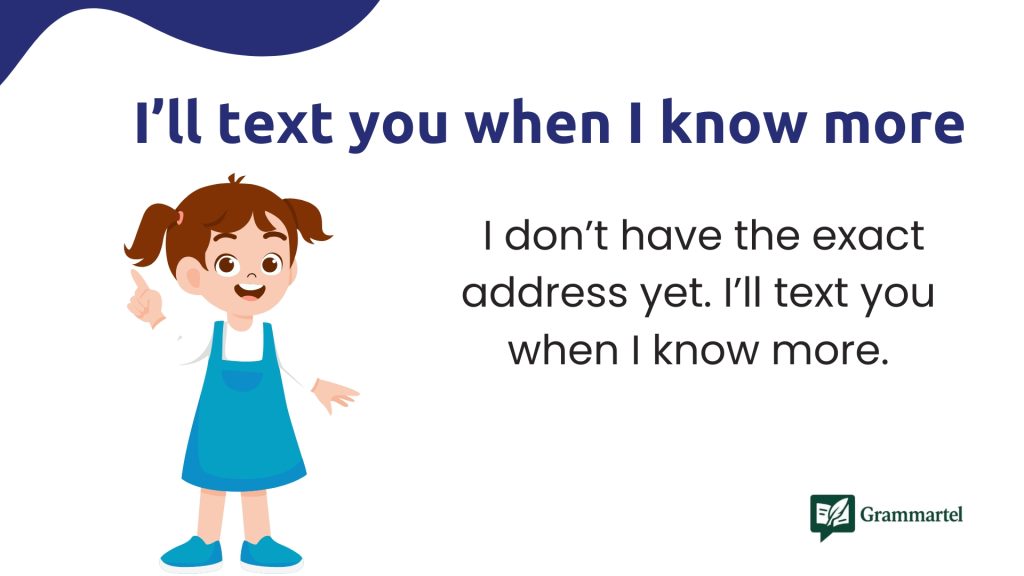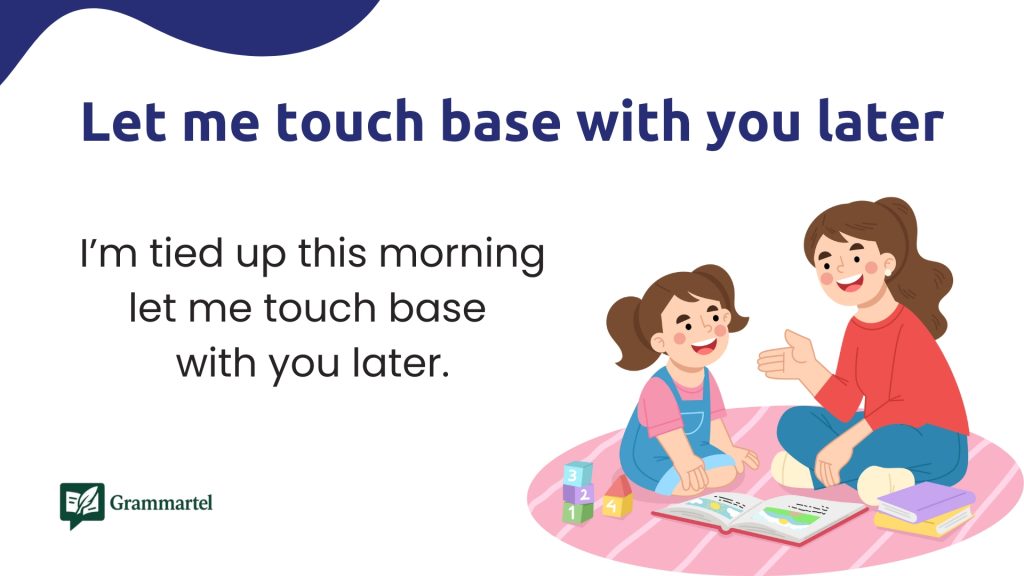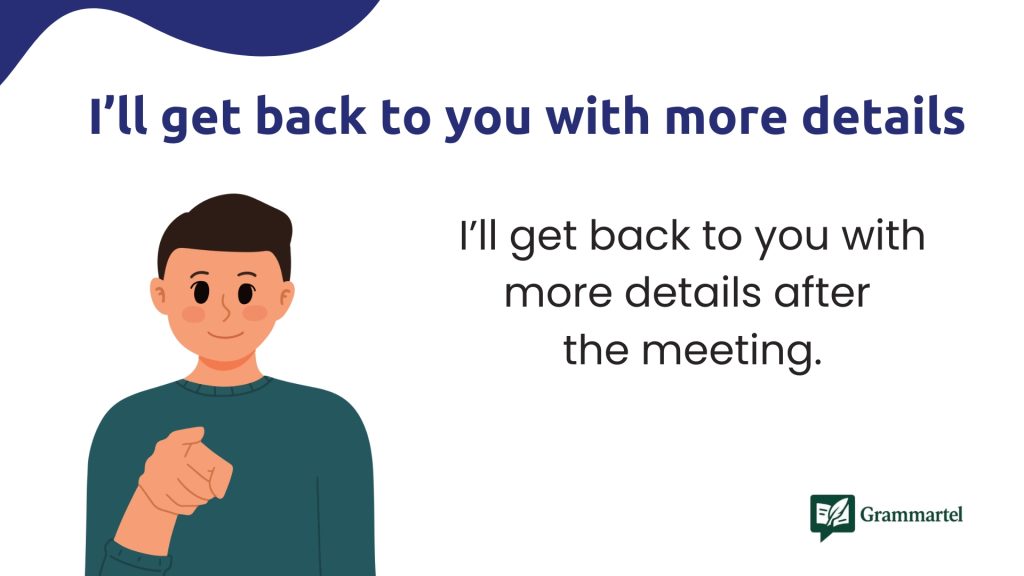Saying “I will let you know” is fine, but let’s be honest—it can feel a little dry or overused. Whether you’re texting a friend, replying to your boss, or handling a tricky client, finding the right way to say it can make your message sound clearer, warmer, or more professional. The words you choose matter more than you think. So if you’re tired of repeating the same phrase over and over, don’t worry—we’ve rounded up 40 better, real-life ways to say “I will let you know.” And yes, they actually work in everyday conversations.
What Does “I Will Let You Know” Mean?
The phrase “I will let you know” means you’ll give someone an answer or update later. It’s often used when you don’t have all the details yet. Instead of saying “yes” or “no” right away, you promise to reply after checking. It’s a polite way to keep the conversation open. For example, if someone invites you to a party and you’re not sure if you’re free, you might say, “I’ll let you know.” It shows interest but gives you time to decide. This phrase is friendly and flexible. You’ll hear it often at work, school, or in daily chats. It helps keep things clear without pressure.
When to Use “I Will Let You Know”
Use “I will let you know” when you need more time before giving a final answer. It’s perfect for moments when plans are not set. For example, if your boss asks if you can work this weekend and you’re unsure, say, “I’ll let you know.” It shows respect and honesty. You can also use it in casual talks—like when a friend asks if you’re coming to dinner. This phrase works well when you want to check your schedule or think first. It gives space to both people. Use it when you don’t want to rush but still want to reply soon. It keeps things kind and clear.
40 Better Ways to Say “I Will Let You Know”
1. I’ll get back to you.

Meaning: I will contact you later with an answer.
Explanation: A common professional way to delay giving a response until more information is available.
Example: “I’m not sure about the meeting time. I’ll get back to you.”
Best Use: In work emails or formal conversations.
Worst Use: In casual, urgent situations.
Tone: Professional, polite
2. I’ll follow up with you.
Meaning: I’ll reach out to update you.
Explanation: Indicates ongoing interest and a future response.
Example: “Thanks for your question. I’ll follow up with you once I confirm.”
Best Use: Business or client communication.
Worst Use: When the matter isn’t worth a follow-up.
Tone: Formal, proactive
3. I’ll keep you posted.
Meaning: I will update you as things develop.
Explanation: Suggests continual updates rather than just one reply.
Example: “The client hasn’t responded yet, but I’ll keep you posted.”
Best Use: Project updates or informal workplace chats.
Worst Use: When no real updates are expected.
Tone: Casual, conversational
4. I’ll let you know as soon as I can.
Meaning: I will tell you when I’m able.
Explanation: Shows urgency and concern.
Example: “I need to check my schedule. I’ll let you know as soon as I can.”
Best Use: When someone needs a timely response.
Worst Use: When you intend to delay without urgency.
Tone: Considerate, responsive
Give this a read : 40 Polite & Professional Ways to Say “For Your Information” (With Examples).
5. I’ll keep you in the loop.
Meaning: I’ll include you in future updates.
Explanation: Often used in collaborative settings.
Example: “Even though you’re remote, I’ll keep you in the loop.”
Best Use: Team or group projects.
Worst Use: One-on-one private matters.
Tone: Friendly, collaborative
6. I’ll circle back with you.
Meaning: I’ll return to this topic with you later.
Explanation: A more corporate way of saying you’ll revisit it.
Example: “Let me check with finance and I’ll circle back with you.”
Best Use: Business meetings or corporate emails.
Worst Use: Personal or informal conversations.
Tone: Professional, structured
7. I’ll reach out once I know more.
Meaning: I’ll contact you when I have the details.
Explanation: Implies a delay is due to pending information.
Example: “We’re still deciding. I’ll reach out once I know more.”
Best Use: Coordinating logistics or plans.
Worst Use: When you do have the information already.
Tone: Honest, patient
8. I’ll update you soon.
Meaning: Expect news shortly.
Explanation: Implies there won’t be a long wait.
Example: “I’m finalizing things now. I’ll update you soon.”
Best Use: When a reply is coming within hours or a day.
Worst Use: When you plan to delay longer.
Tone: Reassuring, timely
9. You’ll hear from me shortly.
Meaning: I’ll contact you very soon.
Explanation: A formal but warm way to show intention to follow up.
Example: “Thanks for your application. You’ll hear from me shortly.”
Best Use: Professional email responses.
Worst Use: When you may not actually reply quickly.
Tone: Courteous, formal
10. I’ll confirm and get back to you.
Meaning: I need to check first before replying.
Explanation: Implies the answer depends on verifying something.
Example: “Let me confirm with the manager and get back to you.”
Best Use: When you genuinely need to verify info.
Worst Use: As a vague excuse.
Tone: Responsible, neutral
11. I’ll let you know once I find out
Meaning: I’ll inform you when I have the answer.
Explanation: Suggests you’re actively seeking the information.
Example: I haven’t heard back from them yet. I’ll let you know once I find out.
Best Use: When you’re waiting on someone else’s input.
Worst Use: If you’re not actively looking for the answer.
Tone: Informative, helpful
12. I’ll inform you soon
Meaning: You will receive details shortly.
Explanation: More formal than “I’ll let you know.”
Example: The details are being finalized. I’ll inform you soon.
Best Use: Business emails or professional announcements.
Worst Use: Casual conversation with friends.
Tone: Formal, precise
13. Let me double-check and get back to you
Meaning: I’ll verify something before replying.
Explanation: Implies that accuracy is important before answering.
Example: That sounds right, but let me double-check and get back to you.
Best Use: When confirming facts or data.
Worst Use: If you’re stalling unnecessarily.
Tone: Careful, responsible
14. I’ll let you know in a bit
Meaning: I’ll contact you shortly.
Explanation: Casual way to say a response is coming soon.
Example: I’m almost done here. I’ll let you know in a bit.
Best Use: Informal chats, texting.
Worst Use: Formal or business situations.
Tone: Casual, relaxed
15. I’ll text you when I know more

Meaning: I’ll message you after getting more info.
Explanation: Preferred when the follow-up will be via text.
Example: I don’t have the exact address yet. I’ll text you when I know more.
Best Use: Personal communication, logistics.
Worst Use: Formal work conversations.
Tone: Informal, direct
16. I’ll drop you a message later
Meaning: I’ll message you later with an update.
Explanation: Friendly and non-urgent way to promise a follow-up.
Example: I’ll drop you a message later once I’m out of the meeting.
Best Use: Informal reminders or updates.
Worst Use: When urgency is needed.
Tone: Casual, easygoing
17. I’ll get back to you ASAP
Meaning: I’ll respond as soon as possible.
Explanation: Adds urgency and care to the promise.
Example: I don’t know the answer off-hand, but I’ll get back to you ASAP.
Best Use: When someone needs an answer quickly.
Worst Use: If you’re not actually planning to reply soon.
Tone: Responsive, urgent
18. I’ll send you an update
Meaning: I’ll provide new information later.
Explanation: A professional and specific way to promise communication.
Example: Once the report is finished, I’ll send you an update.
Best Use: Formal or written communication.
Worst Use: When a direct answer is needed instead.
Tone: Businesslike, clear
19. Let me check and get back to you
Meaning: I need to verify something first.
Explanation: Common phrase that shows diligence.
Example: Let me check with HR and get back to you.
Best Use: When there’s something to confirm before replying.
Worst Use: As a generic delay tactic.
Tone: Thoughtful, respectful
20. I’ll reach out with more info
Meaning: I’ll contact you once I have additional details.
Explanation: A slightly more formal version of “I’ll let you know.”
Example: I’ll reach out with more info once the schedule is confirmed.
Best Use: Email updates or follow-ups.
Worst Use: Everyday casual chats.
Tone: Professional, informative
21. I’ll notify you
Meaning: I will inform you officially or directly.
Explanation: A formal way to indicate that you’ll provide an update.
Example: As soon as the decision is made, I’ll notify you.
Best Use: Formal notices, HR or legal settings.
Worst Use: Casual, friendly conversations.
Tone: Formal, official
22. I’ll shoot you a message
Meaning: I’ll send you a quick message.
Explanation: Casual way to say you’ll follow up, often via text or DM.
Example: I’ll shoot you a message when I’m done here.
Best Use: Informal conversations with friends or coworkers.
Worst Use: Corporate or formal email contexts.
Tone: Laid-back, friendly
23. I’ll reach out to you later
Meaning: I’ll initiate contact again at a future time.
Explanation: Suggests that you’ll follow up without needing a reply.
Example: I need to run now, but I’ll reach out to you later.
Best Use: Business or scheduling conversations.
Worst Use: If there’s urgency or you don’t intend to follow up.
Tone: Polite, neutral
24. I’ll send you a quick update
Meaning: I’ll provide a brief status message.
Explanation: Highlights that the follow-up will be short and focused.
Example: Once I speak with the vendor, I’ll send you a quick update.
Best Use: Work or project-related communication.
Worst Use: When a long, detailed answer is expected.
Tone: Professional, concise
25. I’ll inform you once it’s settled
Meaning: I’ll let you know when things are finalized.
Explanation: Used when a situation is undecided or in progress.
Example: The timeline is still under discussion, but I’ll inform you once it’s settled.
Best Use: When decisions or outcomes are pending.
Worst Use: If no resolution is actually expected soon.
Tone: Diplomatic, patient
26. Let me loop back to you
Meaning: I’ll return with a response after reviewing.
Explanation: A more modern, corporate phrase similar to “circle back.”
Example: I need to check internally—let me loop back to you.
Best Use: Business or team environments.
Worst Use: Informal or personal discussions.
Tone: Modern, corporate
27. I’ll update you when I have clarity
Meaning: I’ll reply once things are clearer.
Explanation: Suggests that current information is incomplete.
Example: There’s still some confusion, but I’ll update you when I have clarity.
Best Use: When projects or issues are in flux.
Worst Use: When the other person needs immediate info.
Tone: Honest, transparent
28. Let me touch base with you later

Meaning: I’ll contact you again soon.
Explanation: A very common corporate phrase for checking in.
Example: I’m tied up this morning—let me touch base with you later.
Best Use: Scheduling or progress check-ins.
Worst Use: Casual chats; may sound too business-like.
Tone: Professional, neutral
29. I’ll check in with you soon
Meaning: I’ll follow up shortly.
Explanation: A soft way to keep communication open.
Example: Things are moving slowly, but I’ll check in with you soon.
Best Use: Friendly work or team conversations.
Worst Use: When something urgent or specific is needed.
Tone: Supportive, relaxed
30. I’ll pass along the info
Meaning: I’ll share the information when I receive it.
Explanation: Often used when you’re not the source but the messenger.
Example: Once I hear back from the director, I’ll pass along the info.
Best Use: Acting as a go-between or relay.
Worst Use: When you are expected to make the decision.
Tone: Helpful, neutral
31. I’ll ping you later
Meaning: I’ll send you a quick message or reminder.
Explanation: Informal way to say you’ll follow up.
Example: I’m in a call now, but I’ll ping you later.
Best Use: Tech, startup, or casual workplace settings.
Worst Use: Formal emails or client-facing conversations.
Tone: Casual, tech-savvy
32. I’ll let you know what I find out
Meaning: I’ll share the outcome of my research or inquiry.
Explanation: Shows you’re actively looking for an answer.
Example: I’m looking into it now—I’ll let you know what I find out.
Best Use: Problem-solving or investigation scenarios.
Worst Use: If you’re not actually checking.
Tone: Engaged, informative
33. I’ll get in touch with you soon
Meaning: I’ll contact you shortly.
Explanation: A polite and somewhat formal expression.
Example: Thanks for your patience. I’ll get in touch with you soon.
Best Use: Customer service or professional follow-ups.
Worst Use: Casual texting or chatting with friends.
Tone: Courteous, professional
34. I’ll let you know once I hear back
Meaning: I’ll tell you when I receive a reply.
Explanation: Implies someone else’s response is required first.
Example: I’ve emailed them already—I’ll let you know once I hear back.
Best Use: When waiting on a third party.
Worst Use: When you already have the info.
Tone: Honest, responsive
35. I’ll update you if anything changes
Meaning: You’ll only hear back if there’s a change.
Explanation: Good for situations that might stay the same.
Example: The event is still on. I’ll update you if anything changes.
Best Use: Planning or event-related discussions.
Worst Use: If you know updates will definitely come.
Tone: Reassuring, measured
36. I’ll be in touch
Meaning: I’ll contact you again.
Explanation: Simple and widely-used phrase for future communication.
Example: Thanks for reaching out. I’ll be in touch.
Best Use: Polite professional closing statements.
Worst Use: When the person expects a specific answer.
Tone: General, noncommittal
Worth a look : 40 Other Ways to Say “Can’t Wait” (With Examples).
37. I’ll drop you a line soon
Meaning: I’ll send you a message shortly.
Explanation: Slightly old-fashioned, but still friendly.
Example: Let’s stay connected—I’ll drop you a line soon.
Best Use: Friendly emails or messages.
Worst Use: Corporate documents.
Tone: Warm, informal
38. I’ll give you an update tomorrow
Meaning: You’ll receive a follow-up the next day.
Explanation: Specifies a time frame, which adds clarity.
Example: I’m still finalizing things—I’ll give you an update tomorrow.
Best Use: Managing expectations with a deadline.
Worst Use: When you’re not sure when you’ll respond.
Tone: Direct, reliable
39. I’ll get back to you with more details

Meaning: I’ll provide further information later.
Explanation: Implies that a detailed response is coming.
Example: I’ll get back to you with more details after the meeting.
Best Use: Project or task-oriented discussions.
Worst Use: When a quick answer is all that’s needed.
Tone: Informative, thoughtful
40. Let me get some clarity and I’ll follow up
Meaning: I need to clear things up before reaching out.
Explanation: Communicates your intention to respond, but only after gaining understanding.
Example: I’m not 100% sure yet—let me get some clarity and I’ll follow up.
Best Use: Complex or uncertain topics.
Worst Use: Simple, yes-or-no questions.
Tone: Careful, respectful
Conclusion
So, there you go—40 simple and better ways to say “I will let you know.” Whether you want to sound more friendly, more confident, or just a little less robotic, there’s an option here that fits. Try a few out next time you’re replying to someone. You might be surprised how much smoother your conversations feel with just a small change in wording.
Unlock your potential by exploring Grammartel advanced Phrases.

